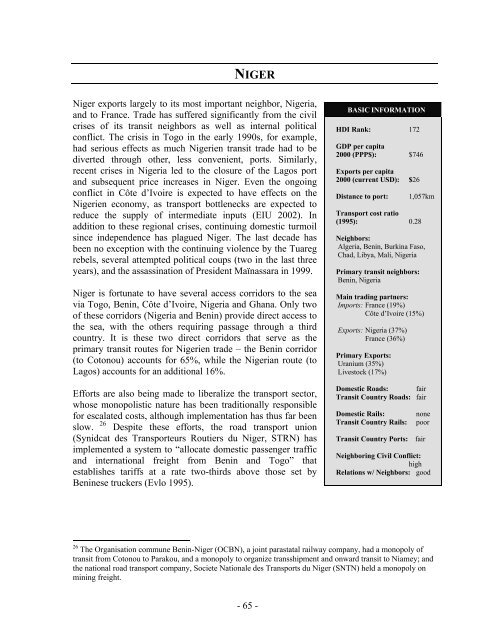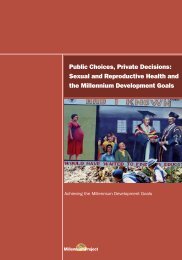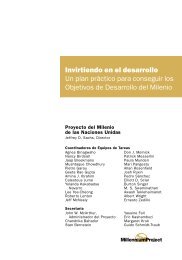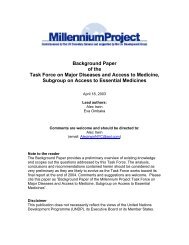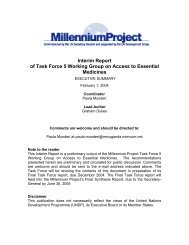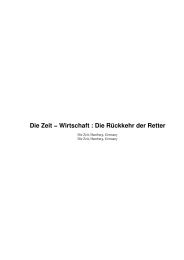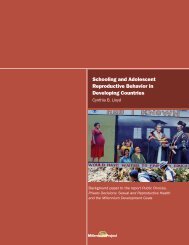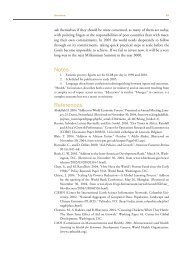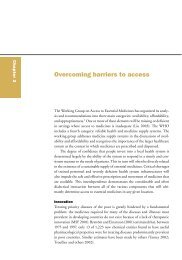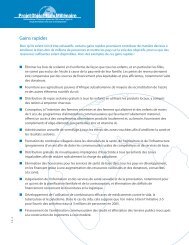the challenges facing landlocked developing countries: a case study ...
the challenges facing landlocked developing countries: a case study ...
the challenges facing landlocked developing countries: a case study ...
You also want an ePaper? Increase the reach of your titles
YUMPU automatically turns print PDFs into web optimized ePapers that Google loves.
NIGER<br />
Niger exports largely to its most important neighbor, Nigeria,<br />
and to France. Trade has suffered significantly from <strong>the</strong> civil<br />
crises of its transit neighbors as well as internal political<br />
conflict. The crisis in Togo in <strong>the</strong> early 1990s, for example,<br />
had serious effects as much Nigerien transit trade had to be<br />
diverted through o<strong>the</strong>r, less convenient, ports. Similarly,<br />
recent crises in Nigeria led to <strong>the</strong> closure of <strong>the</strong> Lagos port<br />
and subsequent price increases in Niger. Even <strong>the</strong> ongoing<br />
conflict in Côte d’Ivoire is expected to have effects on <strong>the</strong><br />
Nigerien economy, as transport bottlenecks are expected to<br />
reduce <strong>the</strong> supply of intermediate inputs (EIU 2002). In<br />
addition to <strong>the</strong>se regional crises, continuing domestic turmoil<br />
since independence has plagued Niger. The last decade has<br />
been no exception with <strong>the</strong> continuing violence by <strong>the</strong> Tuareg<br />
rebels, several attempted political coups (two in <strong>the</strong> last three<br />
years), and <strong>the</strong> assassination of President Maïnassara in 1999.<br />
Niger is fortunate to have several access corridors to <strong>the</strong> sea<br />
via Togo, Benin, Côte d’Ivoire, Nigeria and Ghana. Only two<br />
of <strong>the</strong>se corridors (Nigeria and Benin) provide direct access to<br />
<strong>the</strong> sea, with <strong>the</strong> o<strong>the</strong>rs requiring passage through a third<br />
country. It is <strong>the</strong>se two direct corridors that serve as <strong>the</strong><br />
primary transit routes for Nigerien trade – <strong>the</strong> Benin corridor<br />
(to Cotonou) accounts for 65%, while <strong>the</strong> Nigerian route (to<br />
Lagos) accounts for an additional 16%.<br />
Efforts are also being made to liberalize <strong>the</strong> transport sector,<br />
whose monopolistic nature has been traditionally responsible<br />
for escalated costs, although implementation has thus far been<br />
26<br />
slow. Despite <strong>the</strong>se efforts, <strong>the</strong> road transport union<br />
(Synidcat des Transporteurs Routiers du Niger, STRN) has<br />
implemented a system to “allocate domestic passenger traffic<br />
and international freight from Benin and Togo” that<br />
establishes tariffs at a rate two-thirds above those set by<br />
Beninese truckers (Evlo 1995).<br />
BASIC INFORMATION<br />
HDI Rank: 172<br />
GDP per capita<br />
2000 (PPP$): $746<br />
Exports per capita<br />
2000 (current USD): $26<br />
Distance to port:<br />
1,057km<br />
Transport cost ratio<br />
(1995): 0.28<br />
Neighbors:<br />
Algeria, Benin, Burkina Faso,<br />
Chad, Libya, Mali, Nigeria<br />
Primary transit neighbors:<br />
Benin, Nigeria<br />
Main trading partners:<br />
Imports: France (19%)<br />
Côte d’Ivoire (15%)<br />
Exports: Nigeria (37%)<br />
France (36%)<br />
Primary Exports:<br />
Uranium (35%)<br />
Livestock (17%)<br />
Domestic Roads: fair<br />
Transit Country Roads: fair<br />
Domestic Rails:<br />
Transit Country Rails:<br />
none<br />
poor<br />
Transit Country Ports: fair<br />
Neighboring Civil Conflict:<br />
high<br />
Relations w/ Neighbors: good<br />
26 The Organisation commune Benin-Niger (OCBN), a joint parastatal railway company, had a monopoly of<br />
transit from Cotonou to Parakou, and a monopoly to organize transshipment and onward transit to Niamey; and<br />
<strong>the</strong> national road transport company, Societe Nationale des Transports du Niger (SNTN) held a monopoly on<br />
mining freight.<br />
- 65 -


